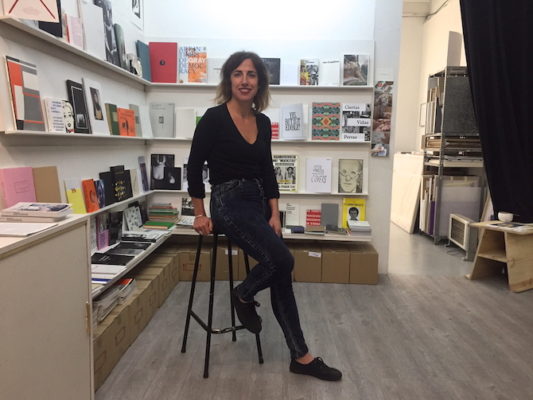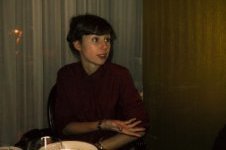Search
To search for an exact match, type the word or phrase you want in quotation marks.
A*DESK has been offering since 2002 contents about criticism and contemporary art. A*DESK has become consolidated thanks to all those who have believed in the project, all those who have followed us, debating, participating and collaborating. Many people have collaborated with A*DESK, and continue to do so. Their efforts, knowledge and belief in the project are what make it grow internationally. At A*DESK we have also generated work for over one hundred professionals in culture, from small collaborations with reviews and classes, to more prolonged and intense collaborations.
At A*DESK we believe in the need for free and universal access to culture and knowledge. We want to carry on being independent, remaining open to more ideas and opinions. If you believe in A*DESK, we need your backing to be able to continue. You can now participate in the project by supporting it. You can choose how much you want to contribute to the project.
You can decide how much you want to bring to the project.

Anna Pahissa is the figure behind Múltiplos, a bookshop specialised in artists publications, that has become a small independent platform and a reference point for the presentation of projects in Barcelona. I ask her about the past and the future, based on her experiences, seeking examples of specific publications with which to illustrate her words.
I found an interview of yours that Sonia Fernández Pan did with you some years ago for her platform Esnórquel. Múltiplos had only been functioning for eight months. Can you say what you have learnt and what has changed?
I believe that the mission and values I established at the beginning regarding this project remain intact. Amongst them is the conception of multiplos as a project with a liquid format but one with a basic definition, that of a structure for the diffusion and distribution of artist’s publications that remains open to the possibility of being modelled according to the interests or circumstances of the moment. Already then I explained that múltiplos was a bookshop but that it could move into other activities or lines of action, and this is exactly what has happened in the almost five years it has been going. It is something I am particularly proud of, perhaps because it is the only form in which I can understand a project or life in general. For example, six months after that interview I had to close the bookshop in Calle Lleó for economic reasons, and múltiplos became a project with no permanent physical space until November 2014 when we reopened our doors in the current premises in Calle Joaquín Costa.
During all this time I have learnt many, many things. It’s a project that started from scratch, having in mind some international references but ones I have tried to obviate in order to generate something very specific: the result of particular interests and a determining context. Through this work, I have learnt about the profession of being a bookseller and distributor and have been able to access many works, projects, and people that over time have become fundamental. Some of the changes affect my perspective on some things, and others have come as a result of the transformations in the context. This latter aspect is important as in the last two or three years the circuit of publications in Spain as become very active in many senses. On the other hand, over time I have shifted my principal interest from the objects towards the context in which these are produced. An artist’s publication is an autonomous object that ought to speak for itself, but at present for me, this object has as much value as the ideology and discourse behind it. They form part of its content, even though they may not be explicit in the final result.
And in the sector, who’s setting the tone at the moment? There’s been a proliferation of fairs, editorials, publications, where are we heading?
I have no doubt that it is always the producers who set the tone, amongst whom I would include artists but also designers, editors, curators, etc. For me, they are the most important voice around which is created a fundamental structure, but one that remains secondary for me. I’m more interested in these diverse and unique voices that endeavour to circumvent certain dominant discourses. With this I’m referring to the trends established by critics; the exhibition scene; the art schools, or fairs. It is something I consider very toxic, and it is habitual in this moment of hyperactivity. Standardized formats and aesthetics are imposed on the contents, or empty or repetitive discourses are some of the questions of which we ought to be particularly critical. So in this sense, I’m fairly reticent about these voices that act as gurus, or publications that are just pretty.
One of the works that particularly interests me within our context is that of Enrique Doza, who amongst other things is at the helm of the project and space Tienda Derecha in Barcelona, and the fanzine project TDpapeles. For me, Enrique unites the profile of the author, editor, catalyst, and agitator that seems very representative and necessary in the current creative scene. I consider TDpapeles one of the most interesting publication projects in this country; to me it seems exceptional the way his forceful discourse is visible in each of his actions, which also included his publications.
múltiplos as an institution is a space that programmes and generates a meeting place for the visual arts and design scene in Barcelona. For me, it forms part of the independent tapestry of the city, in the physical form of a bookshop. Moreover, it now finds itself literally in between two different projects, the gallery EtHall and the project KINO of Nuria Gómez Gabriel. Do you have any intention of working in collaboration?
Indeed, I believe it is interesting and necessary that beyond its economic dimension as a bookshop and distribution office, the space is activated as a meeting place, with a programme that generates contents just as the materials, the books with which I work do. In the same way, Emiliana Larraguibel’s joining the project has been fundamental, as has also the fact of sharing the space with etHALL and the KINO. It has marked a turning point in both my experience and personal relation with the project as much as its evolution. It’s a joy to share my day to day with Núria and Jorge; they are two people and projects whom I love, admire and respect and from whom I’m learning a lot. In both cases, a friendship has been established that has led to the constant exchange of concerns and ideas that propitiate possible collaborations. In this sense, for example, I’d like to highlight the first edition of Cine Quieto Flora that is a project of Núria and Gloria Vilche soon to be presented in múltiplos, and which supposes an editorial shift in a project designed as an online platform focussed on the diffusion and research into the cinematographic image. I find it fascinating this exercise of translation they have developed by taking the project to a printed edition and the collaboration that has been established by presenting and promoting its distribution from múltiplos.
I know that one of your interests as Anna Pahissa beyond Múltiplos, has to do with historical research, always tied to the publication format. In 2014, you made the project Artificialia for The Green Parrot Cabinet that counted with the presence of some Catalan conceptual artists who had used the publication format. Have you continued to investigate this subject? Tell us about the project you want to present in the festival LOOP.
The investigation of publications from the sixties and seventies and the framework in which they were produced continues to be something that really interests me. I can’t perhaps dedicate all the time I would like, given that my priority is what is being produced at the moment, but it is something that is there, as a personal investigation as much as on a commercial level, with the idea of re-distributing them. It is a period that particularly interests me because, amongst other things, I believe it holds many analogies with the current moment, in a much more evident form than the eighties and nineties. As the product of a specific moment in history, at this time, a concept of work is generated with publications with ideologies, aesthetics, and forms of production and collaboration that seem very contemporary to me. It is not in vain that many of the proposals through current artistic practice pass by the reference and revision of this moment, and in the publications this heritage becomes very evident.
It’s for this reason that multiplos’ proposal for this edition of Loop is to show a selection of audio-visual material produced in the context of Better Books, a bookshop that was born at the end of the forties in London, connected to City Lights Books in Ferlinghetti, San Francisco, and which transformed during the sixties into a sort of laboratory that housed printed material and an intense programme linked to artistic practice. This generated a community around it, with artists like John Latham, Bob Cobbing, and Barry Milles. Curiously the space of Better Books included a bookshop, a gallery and a screening room, a fact that I empathise with in a special way given its evident connections with the activities we are developing at Joaquim Costa 30. This type of bookshop housing material linked to artistic practice, as were also Other Books and so in Amsterdam or Printed Matter in New York, have always been very interesting as focal points of production.
Likewise, I find it impossible to think of múltiplos as “just” a bookshop, given that I’m working with material –publications and people-, that has an enormous potential to generate other things and it goes way beyond the objects and their commercial circulation.

Rosa Lleó has been a publisher. From her years in England she has kept the short sentences and vinyl records. Now she writes and occasionally makes exhibitions.
"A desk is a dangerous place from which to watch the world" (John Le Carré)